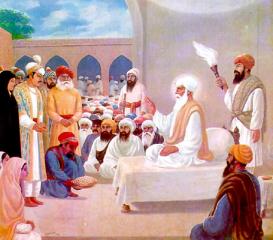Explore the spiritual essence of sangat, the fellowship vital for Sikh community life, fostering selfless service and spiritual growth through shared devotion.
Dive into the origins of Sikh historiography with the Janam Sakhis of Guru Nanak. Discover a blend of myth and tradition in early Sikh history.
Unveil the father of Punjabi novel, Nanak Singh, and explore his impactful storytelling woven with Sikh humanism and Gandhian principles.
Delve into Bhai Gurdas's vars, exploring spiritual insights, Sikh principles, and historical context in 913 poetic stanzas.
AMAR DAS, GURU (1479-1574), the third of the ten Gurus of the Sikh faith, was born into a Bhalla Khatri family on Baisakh sudi 14, 1536 Bk, corresponding to 5 May 1479, at Basarke, a village in present day Amritsar district of the Punjab. His father\'s name was Tej Bhan and mother\'s Bakht Kaur; the latter has also been called by chroniclers variously as Lachchhami, Bhup Kaur and Rup Kaur. He was married on 11 Magh 1559 Bk to Mansa Devi, daughter of Devi Chand, a Bahil Khatri, of the village of Sankhatra, in Sialkot district, and had four children two sons, Mohri and Mohan, and two daughters. Dani and Bhani. Amar Das had a deeply religious bent of mind.
\'Anand\', which the Sikhs reverently call Anand Saheb is among the most popular compositions of Guru Amardas, the third of the ten Sikh gurus. This important composition constitutes on significant part of the daily liturgical recitations prescribed for the Sikhs. The compositions of Guru Amardas in general, and Anand in particular, expresses deep spiritual experiences couched in simple, unembellished diction. The guru is a master at blending profound philosophical tenor with enchanting lyricism in metaphors which are homely, and images that are drawn from everyday life.
BHAGAT BHAGVAN, recipient of one of the bakhshi`shs or seats of the Udasi sect, was a contemporary of Guru Har Rai (1630-61). His original name was Bhagvan Gir. Little is known about his early life except that, according to Udasi sources, he was born in a Brahman family at Bodh Gaya and that he was a Sannyasi sadhu roving in search of spiritual solace. Having heard about Guru Nanak, Bhagvan Gir came to Kiratpur to meet his living successor.
Bara Mah Tukhari written in Tukhari raga by Guru Nanak presents the devotee in the image of a woman who is restless to meet her lover; the romance of nature making her more tense. It is believed that this was the last poetic creation by Guru Nanak. We see the zenith of lyrical and poetic excellence in this \'Calendar Composition\' based on the 12 months of a year. It is one of the most sensitive pieces of this poetic form.
DHARAMSALA or dharamsala from Sanskrit dharmasala, lit. court of justice, tribunal, charitable asylum, religious asylum, stands in Punjabi for a place of worship or the village hospice. Dharamsala as a Sikh institution is the precursor of gurdwara (q.v.). According to janam sakhis, accounts of the life of Guru Nanak (1469-1539). the Guru wherever he went, enjoined his followers to build or set apart a place where they should meet regularly to sing praises of the Lord and to discuss matters of common concern. These places came to be called dharamsalas and the congregations assembling therein became sangats. Dharamsalas grew up in far flung places in the wake of Guru Nanak\'s extensive travels.
GOD, a term used to denote any object, of worship or evocation, signifies the belief of most modern religions in the existence of a Supreme Being who is the source and support of the spatio temporal material world. Theologians remember Him by the name of God. The fundamental belief of Sikhism, too, is that God exists, not merely as an idea or concept, but as a Real Being, indescribable yet not unknowable. The Gurus, however, never theorized about proofs of the existence of God. For them He is too real and obvious to need any logical proof.






